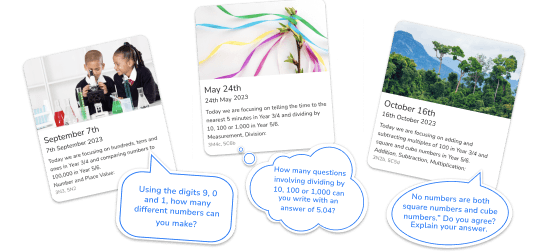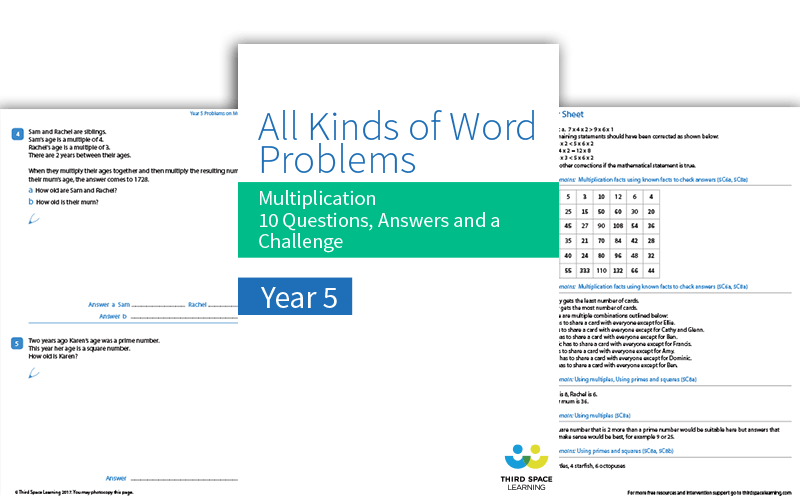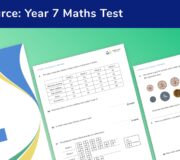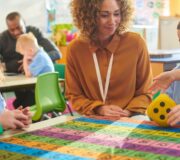20 Multiplication Word Problems for Year 2 to Year 6 With Tips On Supporting Pupils’ Progress
Multiplication word problems are mathematical word problems that use real-life scenarios involving multiplication to find the solution. Multiplication word problems teach pupils to apply their knowledge of their times tables and build up skills in short and long multiplication.
As children advance through primary school, they will develop their times tables skills. By the time children do their multiplication check towards the end of Year 4, pupils should know their times tables up to 12 x 12. Skills to tackle word problems involving multiplication develop alongside this from Year 2 up to Year 6.
All Kinds of Multiplication Word Problems
Download this free, printable pack of multiplication word problem worksheets to challenge your pupils and develop their multiplication and problem solving skills.
Download Free Now!- How to build mathematical skills to tackle multiplication word problems
- Multiplication word problems in the National Curriculum
- Why are multiplication word problems important for children’s understanding of multiplication
- Teaching how to solve multiplication word problems in primary school
- Example of a multiplication word problem
- Examples of multiplication word problems in the primary setting
- Multiplication word problems for Year 2
- Multiplication word problems for Year 3
- Multiplication word problems for Year 4
- Multiplication word problems for Year 5
- Multiplication word problems for Year 6
- More word problems resources
How to build mathematical skills to tackle multiplication word problems
As children develop their knowledge of multiplication, it is essential that they are exposed to visuals and concrete manipulatives to understand the concept of multiplication. These resources aim to aid children’s understanding of multiplication and allow them to make connections to real-world situations.
As children become more confident in their ability to multiply they will start to apply their skills to beyond one-step problems and begin to solve complex word problems, and multi-step problems that may involve more than one operation.
In two-step problems children may need to use their addition word problems, subtraction word problems, fraction word problems and division word problems skills to find the solution. These skills are built upon throughout KS1 and KS2. Furthermore, having a pupil who understands place value will also aid them in their problem solving skills.
It is important that children are exposed to arithmetic activities and fluency tasks together with regular word problems. To help, in this blog you will find multiplication word problems for all years from Year 2 up to Year 6, complete with examples and solutions for you to use with your pupils.
Multiplication word problems in the National Curriculum
The National Curriculum states that children should first be exposed to multiplication word problems in Key Stage 1. By the end of Key Stage 2, children should be able to use multiplication to solve real life word problems and understand the relationship between multiplication and division, and that one is the inverse of the other.
Our curriculum aims to ensure that children understand the meaning of multiplication and the vocabulary that runs parallel to it. They first solve simple one-step multiplication word problems involving equal groups using arrays and repeated addition.
Pupils progress to using multiplication to find the total in a set of equal groups and then begin to solve more complex multiplication word problems that involve finding unknown quantities or missing values. Children will also be able to multiply by two-digit numbers and learners will be able to solve long multiplication in multi-digit scenarios.
Multiplication in Year 2
In Year 2, children learn their 2, 5 and 10 times tables and their multiplication and division facts for these tables. Additionally, they begin writing the multiplication, division and equals signs and show that multiplication of two numbers can be done in any order due to the commutative theory.
Year 2 pupils use arrays, repeated addition, concrete materials and mental methods to solve word problems.
It is also important to develop our pupils’ vocabulary and to consider the different ways of saying we are multiplying. Multiplication word problems are fantastic at doing this by using phrases such as ‘the product of’, ‘equal groups’, ‘use multiplication tables’ and ‘arrays’. Concrete materials will obviously assist in this understanding too.
Multiplication in lower KS2
In Year 3 students learn their 3, 4 and 8s times tables. In Year 4 students tackle their 6, 7, 9, 11 and 12s times tables they also begin to successfully write and calculate multiplication statements and solve missing number problems.
They will also develop efficient mental methods using commutativity and associativity such as 5 x 8 = 40 and so 8 x 5 = 40 as well as deriving related facts such as , if 2 x 3 = 6 then 20 x 3 = 60. Pupils will also practise their written multiplication strategy starting with calculations of two-digit numbers by on-digit numbers via short multiplication.
By the end of Year 4 pupils will mentally know and use place value to understand about multiplying by 10 and 100, recognise and use factor pairs and be able to multiply three-digit numbers by one-digit numbers.
When working on multiplication word problems, pupils will look at integer scaling problems and more complex correspondence problems such as ‘n objects are connected to m objects’. These two-step problems will be based on real-life scenarios around: measure, money and fractions.
Multiplication in upper KS2
In upper Key Stage 2, pupils continue to practise short multiplication and are also introduced to long multiplication. Pupils multiply 4-digit numbers by one-digit (short multiplication) and 4-digit numbers by two-digit (long multiplication).
Children should use their knowledge of factors, multiples, prime and cubed numbers to assist them in their problem solving. Again, a heavy focus on real-life context questions is key as children build up to their SATs tests. Being familiar with multi-step word problems and knowing how to apply their knowledge of multiplication in a quick, accurate manner is essential.
Why are multiplication word problems important for children’s understanding of multiplication
Word problems are a great opportunity to bring maths to life. They enable children to see the link between the maths they do in the classroom and how they can apply it in real-life scenarios and avoid the phrase ‘why do we need to learn this anyway?’
In Key Stage 1 word problems allow for the chance to use concrete materials and manipulatives rather than a constant stream of multiplication word problem worksheets.
Children get a hands-on opportunity to problem solve and visually see how to create arrays or use repeated addition. Whilst this continues into Key Stage 2, learners will use concrete materials less and instead embark on the formal written methods of short multiplication and long multiplication so that they become confident with mental and formal methods.
In addition, children develop key skills such as:
- building problem solving skills
- developing mathematical language skills
- develop an understanding between multiplication and division and how we can use, and may need to use both, to solve two-step problems. We may need to multiply before we use long division for example.
- be able to apply mathematical concepts to real life situations.
Teaching how to solve multiplication word problems in primary school
Once the concept of multiplication is embedded and children understand how to use concrete materials, for example how to visually create an array to represent the multiplication needed, the next step is to advance to multiplication word problems.
When providing children with multiplication word problem worksheets or multiplication word problems challenge cards, it is important that children are able to read the question carefully and understand the context before extracting the maths from it.
Pupils need to be able to interpret what they are being asked. What operation do they need to do? Or do they need to do two operations? Is it a one-step problem or a two-step problem? In the word problems below the focus will be multiplication, whether representing it visually, like in Key Stage 1, or moving up to formal written methods in Key Stage 2.
Example of a multiplication word problem
Amy is making the party bags for her birthday party. She has invited 10 friends and they will have three chocolates in their bag. How many chocolates will Amy need altogether?
How to solve this:
Firstly we need to know that Amy has invited 10 friends so there will be 10 party bags. She will put 3 chocolates in each bag. So we know:-
- There are 10 friends/party bags
- They will have 3 chocolates each
- We therefore need to multiply, or use repeated addition, to times 10 by 3 to solve the problem.
- So to solve this problem we could draw a number line starting at zero (0) and repeatedly add three (3) each time. We need to repeat this ten (10) times to attain the answer.
- We could mentally use our times table knowledge to do 10 x 3, or 3 x 10 or visually represent this as an array. We could even show this as a bar model.
- We could formally use short multiplication to solve this problem.
How would we represent this pictorially?
Below are visual representations of the above problem to show how a child may represent this problem using any of the strategies above:
How we would represent this with repeated addition:
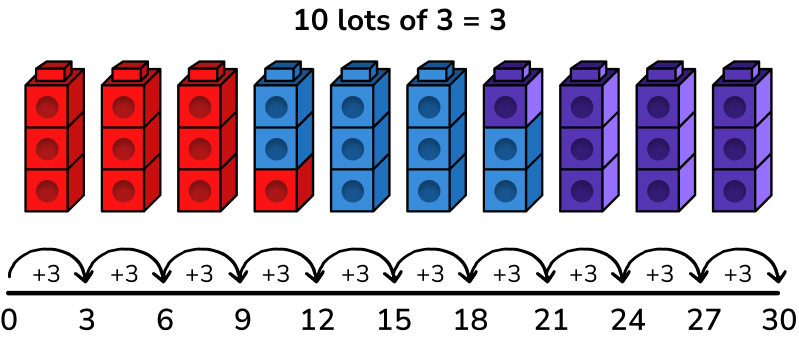
Or as an array:

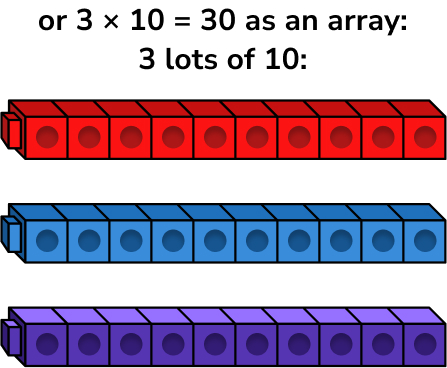
Examples of multiplication word problems in the primary setting
Below are examples of what can be expected at each year group from Years 2 to 6. Through our tutoring programme at Third Space Learning, our tutees will become familiar with word problems throughout their learning. They will encounter word problems on a regular basis with each lesson personalised to develop the learning our tutees need.
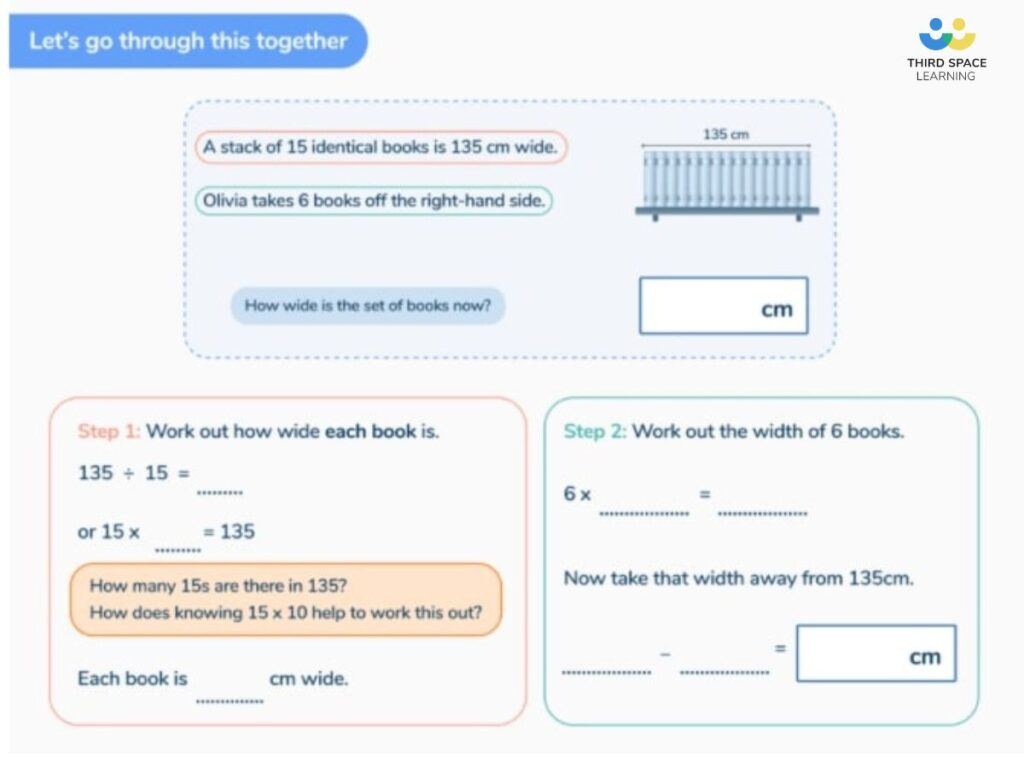
The word problems will increase their confidence, familiarity with vocabulary and mathematical understanding whether using our materials in tuition sessions, in the classroom or in small intervention groups.
Multiplication word problems for Year 2
In Year 2 children, children solve multiplication problems focusing on the 2, 5 and 10 times table. It is essential at this point that children use concrete materials, discover how to use repeated addition and arrays to solve word problems that have a context to them. They should be encouraged and aided in representing the word problem visually as well as developing their mental methods to solve such problems.
Question 1
Mia is picking flowers. A flower has 5 petals on it. How many petals will be on 6 flowers?
Answer: 30 petals
How we can solve this using repeated addition:
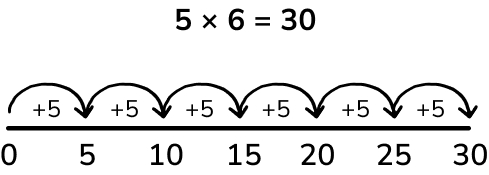
How we can solve this using arrays:
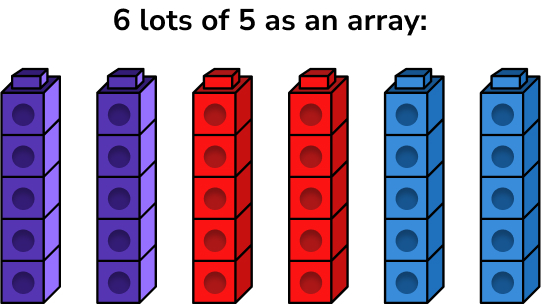
How we can show this pictorially:

Question 2
Sam is at the shops and sees a bouncy ball is 10p.
Sam wants to buy 8 balls. How much will it cost?
Answer: 80p
Question 3
Hansi has 4 packets of stickers with 5 stickers in each packet.
Robert has 3 packets of stickers with 10 stickers in each packet.
Who has the most stickers? Why?
Answer: Robert because Hansi has 20 stickers (4 x 5) but Robert has 30 stickers (3 x 10).
Question 4
Daisy and Ollie are sharing some marbles. They have 5 boxes of marbles, and once they have shared them they have twenty marbles each. How many marbles are in each box?
Answer: 8 marbles.
If they have 20 marbles each then in total there are 40 marbles (20 x 2 = 40). If there are 5 boxes of marbles then there are 8 marbles in each box as 40 divided by 5 is 8. Some may also know the inverse here in that 5 x 8 = 40.
Multiplication word problems for Year 3
With word problems for Year 3, pupils should begin using their recall of the 3, 4 and 8 times table to help with multiplication word problems and be able to multiply 2-digit numbers by 1-digit numbers using mental and short multiplication. Children may also use the grid method to solve these 2 by 1 digit multiplication word problems. This is also an ideal time to introduce money word problems.
Question 1
It is half term and a family of 4 are going to the cinema! Each ticket costs £8. How much would it cost for the family to go to the cinema?
Answer: £32.
As 4 multiplied by 8 equals 32. We can solve this mentally and by knowing the times table fact 4 x 8 = 32 or 8 x 4 = 32.
We could also show this in bar model method:
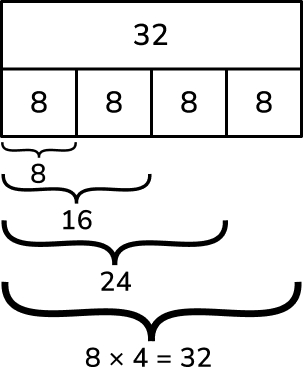
Question 2
If there are 12 cars in the car park and they all have 4 wheels, how many wheels are there altogether?
Answer: 48 wheels.
4 x 12 = 48
Question 3
There are 24 bottles of milk in a crate. Our school has ordered 5 crates.
How many bottles of milk are there in total?
Answer: 120 bottles of milk
Here we can use short multiplication to multiply 5 by 24 as shown below:
Question 4
If it costs £3 to attend the school production and we have 40 people attending, how much money will the school make overall?
Answer: £120
Similar to question 3, we would use short multiplication to multiply 40 by 3 and this would equal 120. We then insert the units (£) so that it remains in context.
Multiplication word problems for Year 4
When solving word problems for Year 4, pupils should be using their full knowledge and recall of times tables to 12 x 12 to help with short multiplication of 2-digit and 3-digit numbers by a 1 digit number. Word problems may also involve multi step problems and there will be exchanges taking place too.
Question 1
Danni multiples an integer (whole number) by 10.
Her answer is between 380 and 430.
What number could Danni have multiplied by 10? Can you list three possibilities?
Answer: The number could have been any of 38, 39, 40, 41, 42 or 43
Question 2
If a baker bakes 124 cookies in one day, how many will the baker have baked in 12 days?
Answer: 1,488
We could use the grid method to multiply here and it would look like this:
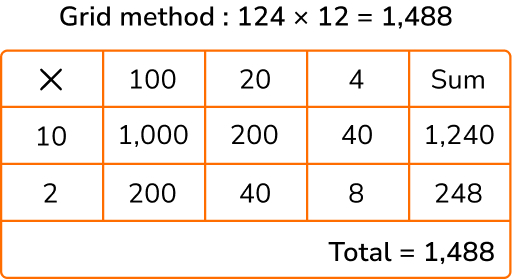
Or we could use short multiplication as well, using our knowledge of the 12 times table.
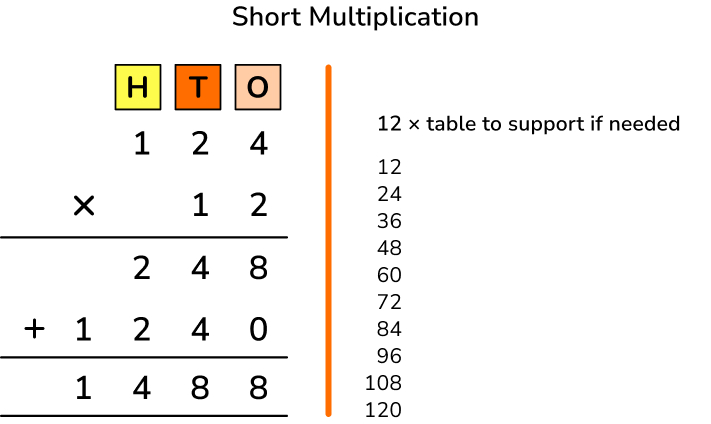
Question 3
Year 4 is going on a school trip to a theme park! Each child ticket costs £16 and there are 245 children going. How much will it cost for Year 4 to go?
Answer: £3,920
Question 4
Nathan runs 1.2 km. Lucy runs 10 times as far as Nathan.
How far has Lucy ran?
Answer: 12km
Multiplication word problems for Year 5
Whilst short multiplication is still practised for fluency, there is a shift towards using long multiplication in word problems for Year 5, as children begin to multiple 4-digit numbers by 1-digit numbers and 2-digit numbers. There is also exposure to multi-step problems in preparation for the SATs at the end of Year 6.
Question 1
Jack and Ella are practising their short multiplication and have both attempted the same question.
The question is: What is 1,235 x 7?
Jack says the answer is 7,415 but Ella says the answer is 8,645.
Who is correct and what mistake has one child made?
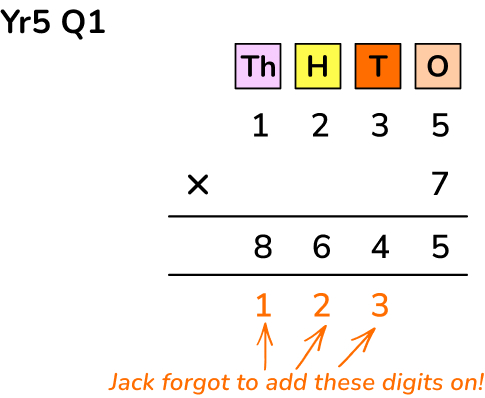
Answer: Ella is correct, the answer is 8,645 and the mistake made is that Jack forgot to add on the carried over digits.
Question 2
If a shop makes £2,782 in a day, how much will it make in one week?
Answer: £19,474
Note: For this question we must know that there are 7 days in one week as we then have to multiply 2,782 by 7.
Question 3
A group of friends go for lunch at the local restaurant. 6 of them decide to buy chicken nuggets and chips which costs £6.95 each and the other 4 friends decide to buy pizza and salad for £7.59 each. What do the friends spend more on, chicken nuggets or pizza?
Answer: Chicken nuggets
Chicken nuggets = 6.95 x 6 totals £41.70 whereas pizza = 7.59 x 4 totals £30.36. Therefore, they spend more on chicken nuggets.
Question 4
A Premier League football club has a mean (average) attendance of 33,298 people each match. There are 46 games in a season, what is the total attendance for the whole season?
Answer: A total attendance of 1,531,708
Multiplication word problems for Year 6
With the end of the primary school journey in sight, word problems for Year 6 are expected to be able to use mental methods to solve the more simple multiplication word problems, such as multiplying by a multiple of 10, and then use short and long multiplication efficiently. They will be able to multiply decimals as well as 4-digit numbers multiplied by 2-digit numbers. They will also be versed with two-step problems and using more than one operation in a question.
Question 1
There are 67 chewy sweets in a packet. If the supermarket orders in 8657 packets, how many sweets would there be altogether?
Answer: 580,019 sweets
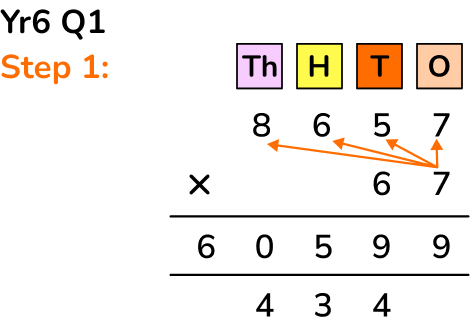
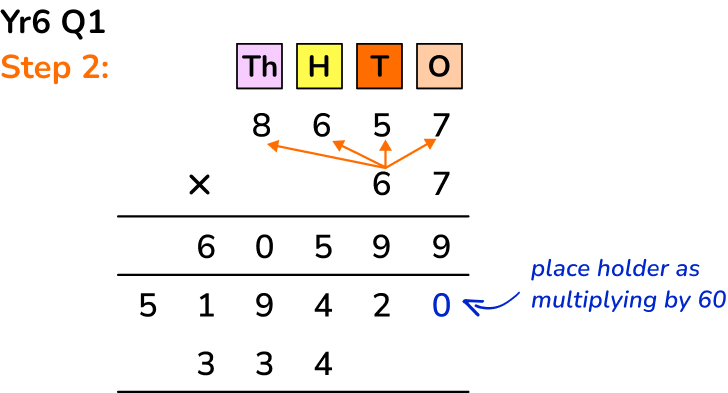
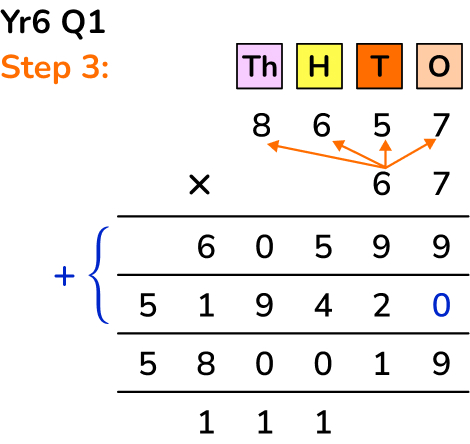
Question 2
Bobby chooses a number between 300 and 320.
She divides it by 6 then subtracts 17 from it.
She then divides that number by 4.
Her answer is 8.5.
What number did she start with?
Answer: 306
Here it is essential to work backwards from the answer 8.5 and do the inverse at each step. So we multiply instead of divide and we add instead of subtract.
Question 3
Miss Dobson is making cakes to sell at the school fair.
Strawberries cost £5.60 per kg.
Eggs cost £1.70 per box.
Icing costs 89p per kg.
Cake cases are £3.25 for 10.
She uses 8 kg of strawberries, 10 boxes of eggs, 11 kg of icing and 40 cake cases to make 40 cakes.
Calculate the total cost for 40 cakes.
Answer: £84.59
The strawberries are: £5.60 x 8 = £44.80
The eggs are: £1.70 x 10 = £17.00
Icing costs are £0.89 x 11 = £9.79
Cake cases are £3.25 x 4 = £13.00
Question 4
There are 26 white buttons in a pack and 13 blue buttons in a pack.
The school buys 1,460 packs of white buttons and 730 packs of blue buttons.
Is it true that the school would have four times as many white buttons as blue buttons? Show your working in your answer.
Answer: It is true because there are 37,960 white buttons and there are 9,490 blue buttons.
If we then multiply 9,490 by 4 we get 37,960. Or alternatively we could divide 37,960 by 4 and get 9,490.
More word problems resources
Third Space Learning offers a big collection of practice word problems covering a wide range of topics for all primary year groups. Take a look at our addition and subtraction word problems, time word problems, ratio word problems and percentage word problems.
DO YOU HAVE STUDENTS WHO NEED MORE SUPPORT IN MATHS?
Every week Third Space Learning’s specialist primary maths tutors support thousands of students across hundreds of schools with weekly online 1 to 1 maths lessons designed to plug gaps and boost progress.
Since 2013 these personalised one to one lessons have helped over 150,000 primary and secondary students become more confident, able mathematicians.
Learn how tutors develop pupils’ maths fluency or request a personalised quote for your school to speak to us about your school’s needs and how we can help.
